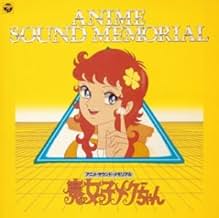NOTE IMDb
7,1/10
86
MA NOTE
Ajouter une intrigue dans votre langueMegu wants to become the queen of the demon world. She is sent to earth as a test with her rival, Non.Megu wants to become the queen of the demon world. She is sent to earth as a test with her rival, Non.Megu wants to become the queen of the demon world. She is sent to earth as a test with her rival, Non.
Parcourir les épisodes
Histoire
Le saviez-vous
- Bandes originalesMajokko Meg-chan
(Witch Girl Meg)
(Opening Theme)
Lyrics by Kazuya Senke
Music by Takeo Watanabe, Arrangements by Yûshi Matsuyama
Performed by Yuuko Maekawa
Commentaire à la une
Megu (known as Bia or simply Meg in Western dubs) is a 15-year-old girl who is a contender for the throne of the kingdom. As part of her training, she needs to learn about the human world, and so she moves in with Mammi, a former witch who gave up her own ambitions of being queen to marry and raise a family in the human world. Mammi can still use some magic, and so she casts a spell over her husband and her two biological children (son Rabi and daughter Apo) to make them believe that Meg is the oldest daughter in the family. Meg attends school, experiences her first crush, and goes through all the things that normal teenage girls go through - and many that most teenage girls DON'T go through - while she trains to become queen and grows stronger in the use of her magic. As with many shows in the magical girl genre, Meg has a rival, the cold-hearted Non (Noa), who is also living with a "host family" including another former witch who used to be Mammi's rival. Non is more skilled with her magic than Meg and looks down on her - and actually tries to kill her during their first meeting! (Although, Non sometimes helps Meg out when she's in trouble, more to keep the competition fair than out of friendship.) Meanwhile, she has to put up with voyeurs who are always trying to get a glimpse of her panties - namely her own kid "brother" Rabi and a "dirty old man" named Chou-san (who is assisted by a talking bird and cat). Toei Animation's 72-episode magical girl series of 1974-1975, co-directed by Yugo Serikawa (MAZINGER Z) with episodes written by Masaki Tsuji (DEVILMAN, CAPTAIN FUTURE, CUTEY HONEY, ASTRO BOY), takes a few obvious pages from the Cutey Honey playbook, with all the panty shots and scenes of Meg in her green see-through negligee and some brief, non-explicit nudity. (There's even a cameo by Cutey Honey's singer persona, Misty Honey, in one episode!) This helped make the series a hit with male as well as female viewers in Japan. (One suspects that this may have been a boyhood favorites of some of the guys who grew up to form Gainax, which took the fan service angle and ran with it!) While the fan service may have been one of the series' chief selling points (as evidenced by the original Japanese opening theme song lyrics in which Megu boasts about the size of her breasts and her ways of attracting boys), Majokko Megu-chan is much more than just a never-ending parade of panchira. The series actually teaches some very good lessons, particularly about the importance of friends and family. Meg has a hard time adjusting to life on earth at first, both at home and at school, but in time she comes to understand what family means and why it is so important, and she matures from being essentially a selfish, self-centered brat to a more giving and thoughtful person (though still not without her flaws - which makes her seem all the more real). And there are a lot of elements in this series that foreshadow Sailor Moon and other magical girl series of years to come (one of them being the heroine's short skirt). Very popular in some European countries, especially in Italy, Majokko Megu-chan has never been released in English and I wouldn't expect it to be. It looks very much like a product of the '70s especially in regard to fashions and social conventions, so it has the same kitschy charm as an ABBA song. The quality of the animation is quite good for a 1970s TV anime, though some episodes look better than others in terms of animation quality, particularly the ones with animation by the legendary Shingo Araki. In terms of voices, I've seen parts of both the Japanese and Italian versions (non-subtitled, though it isn't hard to figure out what's going on) and both are good. If you know your '70s anime, you'll recognize Rihoko Yoshida (Natsuko in Cutey Honey, Klara in Alps no Shojo Heidi, Michiru in Getter Robo, Tickle in Majokko Tickle) as the voice of Meg. If you're a fan of the magical girl genre and get a chance to see even one episode of Majokko Megu-chan, grab it. It's interesting as not only entertainment but as a piece of anime history, as a predecessor of fan service anime and of Sailor Moon.
Meilleurs choix
Connectez-vous pour évaluer et suivre la liste de favoris afin de recevoir des recommandations personnalisées
Détails
Contribuer à cette page
Suggérer une modification ou ajouter du contenu manquant

Lacune principale
By what name was Meg la sorcière (1974) officially released in Canada in English?
Répondre





